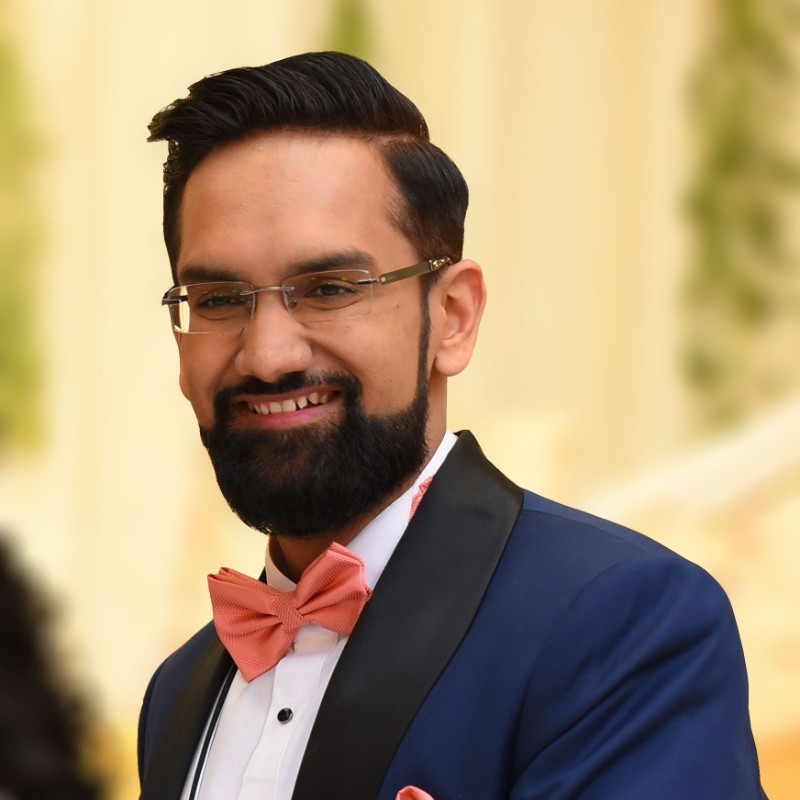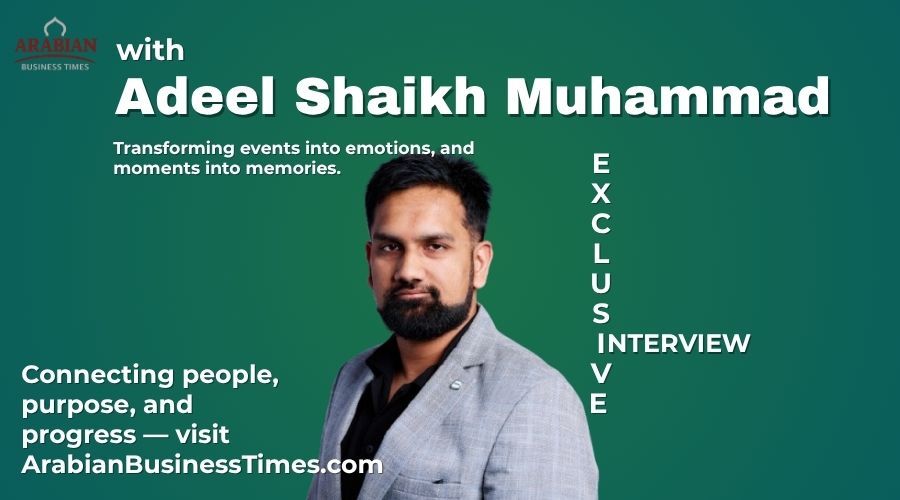In an era where technology evolves faster than regulation and innovation often outpaces ethics, cybersecurity has become more than a technical discipline — it’s a moral and strategic frontier. At the intersection of artificial intelligence, governance, and human responsibility stands Adeel Shaikh Muhammad, a cybersecurity visionary, author, and global thought leader. With over 15 years of experience and more than 40 professional certifications, he has helped organizations transform their Security Operations Centers (SOCs) into predictive, AI-driven ecosystems. In this exclusive conversation with Arabian Business Times, he shares his journey, his views on AI’s transformative power, and his mission to make cybersecurity not just smarter — but more ethical, resilient, and human-centric.
Taim Al Falasi :
What inspired your journey into cybersecurity, and how did you evolve into a thought leader and author?
Adeel Shaikh Muhammad :
I started in IT from my childhood — my father used to run a computer training institute, so as far back as I can remember, I’ve seen computers around me. The first computer came to our institute in 1986, even before I was born, and that early exposure shaped my curiosity. I began my career in helpdesk, systems, and network roles, but soon realized my deeper interest was in securing environments rather than just building them. That passion drove me toward cybersecurity. Over the years, my journey evolved from hands-on security architecture to thought leadership — writing books like “AI-Driven Transformation of SOCs” and “AI and Us: The Ethical Choices” allowed me to share insights with the wider community and help others navigate this AI-powered security era.
Taim Al Falasi :
How do you see AI transforming SOCs and SecOps in the Gulf region and globally?
Adeel Shaikh Muhammad :
AI is shifting SOCs from reactive to predictive mode. In the Gulf, where digital transformation and smart governance are national priorities, AI is enabling faster threat detection, automated response, and proactive risk prediction. Globally, we’re seeing AI-driven analytics, behavioral monitoring, and automation redefine SecOps efficiency, reducing response time and minimizing human fatigue. The future SOC will not just detect threats but anticipate and neutralize them before impact.

Taim Al Falasi :
What are the biggest cybersecurity challenges organizations face today, and how do you help overcome them?
Adeel Shaikh Muhammad :
One of the most persistent challenges is the global shortage of skilled cybersecurity professionals, studies show that large numbers of critical positions remain unfilled, leaving companies vulnerable. In parallel, we’re seeing a dramatic increase in AI-enabled threats: attackers leveraging generative AI for phishing, deepfakes, prompt-injection, supply-chain manipulation and other high-velocity tactics that bypass traditional defences. To help organizations overcome this, I deploy a combined strategy: build scalable automation and AI-enhanced detection to compensate for talent gaps, redesign operational playbooks to counter AI-sophisticated attacks, and boost internal capability via targeted upskilling and strategic partnerships.
Taim Al Falasi :
How do you align technology solutions with organizational goals and risk management as a strategist and solution architect?
Adeel Shaikh Muhammad :
I strongly believe cybersecurity should enable business, not slow it down. My approach is rooted in the People, Process, and Technology (PPT) framework: ensuring each solution strengthens all three pillars. When meeting with C-suite leaders, I translate complex cybersecurity concepts into business language, focusing on outcomes like revenue protection, regulatory assurance, reducing cost, minimizing risk / downtime and increasing customer trust. Every security initiative must make business sense, whether it’s improving resilience, supporting digital transformation, or optimizing operational efficiency. My goal is to transform cybersecurity from a technical domain into a strategic driver of growth and governance.
Taim Al Falasi :
How have your books on AI and cybersecurity influenced the industry, and what key message do you want readers to take away?
Adeel Shaikh Muhammad :
Both books have sparked conversations around the ethical and operational impact of AI in cybersecurity. “AI-Driven Transformation of SOCs & SecOps” empowers professionals to embrace AI intelligently, while “AI and Us” encourages responsible innovation. My core message: technology must serve humanity; security and ethics should evolve hand in hand.
Taim Al Falasi :
With over 40 certifications, how do you keep pace with emerging technologies and evolving cybersecurity threats?
Adeel Shaikh Muhammad :
Cybersecurity is an ever-changing world, especially after the rise of AI, where the threat landscape evolves almost daily. To stay relevant, I believe the best investment anyone can make is in themselves. For me, continuous learning isn’t optional; it’s a discipline. Every certification I pursue helps me sharpen my perspective, bridge theory with real-world practice, and adapt to the next wave of technological disruption. Staying ahead means staying curious, humble, and committed to growth.
Taim Al Falasi :
How should organizations balance AI innovation with governance, compliance, and ethical responsibility?
Adeel Shaikh Muhammad :
Balancing AI innovation with governance and ethics is one of the biggest responsibilities of our time. That’s exactly why I wrote “AI and Us: The Ethical Choices” because questions like “If AI makes a decision, who is accountable?” or “How do we ensure AI isn’t biased?” can’t be ignored. Organizations must adopt structured frameworks such as ISO/IEC 42001, NIST AI Risk Management Framework, and align with regulations like the EU AI Act to ensure transparency, fairness, and accountability. Ethical responsibility isn’t just about compliance, it’s about building trust. True innovation happens when governance and ethics evolve alongside technology.
Taim Al Falasi :
What trends do you predict for cybersecurity in the next 5–10 years, especially regarding AI, compliance, and threat mitigation?
Adeel Shaikh Muhammad :
The next decade will redefine cybersecurity as we know it. We’ll move from manual response models to autonomous and self-healing security ecosystems, powered by AI and continuous learning algorithms. Quantum-resilient encryption, AI governance automation, and real-time compliance monitoring will become standard. Attackers will use generative AI for highly convincing social engineering and identity spoofing, pushing defenders to rely on adaptive, behavior-based defenses. I also foresee GRC platforms evolving into predictive engines that blend compliance with analytics, enabling organizations to forecast and mitigate risks before they surface. In short, cybersecurity will shift from protection to prediction, from defending the past to anticipating the future.
Taim Al Falasi :
How important is knowledge sharing and community engagement in shaping the cybersecurity ecosystem?
Adeel Shaikh Muhammad :
It’s vital. Knowledge hoarded is protection lost. Through mentoring, publications, and global speaking engagements, I believe in empowering the community. Collaboration across public and private sectors is how we collectively raise the bar for cyber resilience.
Taim Al Falasi :
What advice would you give to aspiring cybersecurity professionals and leaders building AI-ready security infrastructures?
Adeel Shaikh Muhammad :
Stay curious, stay ethical, and build multidisciplinary skills. Understand both business and technology. AI won’t replace professionals, but professionals who use AI effectively will replace those who don’t. Most importantly, focus on purpose; securing the digital world is not just a career, it’s a responsibility.
Conclusion
As the world accelerates toward a hyperconnected, AI-powered future, voices like Adeel Shaikh Muhammad remind us that the true essence of cybersecurity lies not in fear, but in foresight. His journey from hands-on IT to authoring globally recognized books reflects the evolution of a leader who bridges technology and humanity. Whether mentoring young professionals, shaping enterprise defense strategies, or promoting ethical innovation, his message is clear: security is not just a system — it’s a shared responsibility. Through knowledge, collaboration, and continuous learning, he envisions a world where digital transformation and trust advance together.

